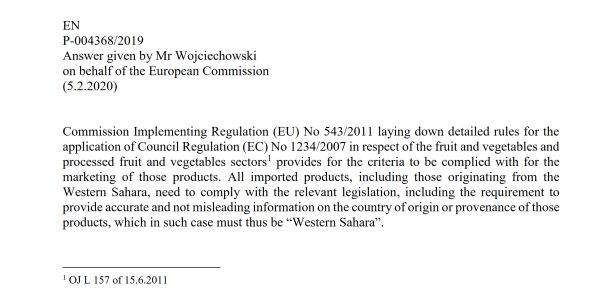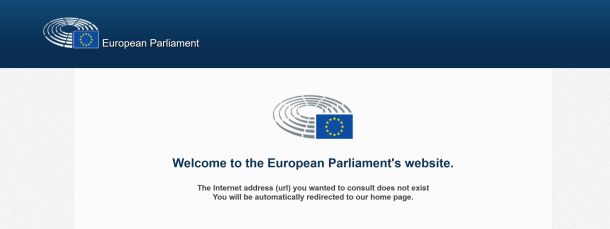
[This article was updated on 8 May 2017]
A series of Spanish regions and municipalities have over the course of the last weeks adopted statements demanding respect of the Court of Justice of the EU judgement from 21 December 2016.
The judgment put a halt to the inclusion of Western Sahara in EU-Morocco trade deals, as the territory is separate and distinct from Morocco. The latest Spanish regional assembly to pass such a statement was the one in Galicia on 25 April 2017.
Western Sahara Resource Watch had written earlier about a similar case, in which the parliament of the Basque Country adopted the same statement on 3 March 2017.
There have since then been many more:
The autonomous regions of Extremadura 23 March 2017, the Balearic Islands 28 March, Aragón 30 March, Catalunya 5 April, Cantabria 2 May, the municipalities of Ortuella 30 March, Etxebarri 3 April, Rota 20 April, Alcazar de San Juan 26 April, El Trabuca 31 March.
Also the cities of Bilbao and Las Palmas, and the town of Villanueva del Trabuco, near Malaga, is said to have adopted a similar statement.
It is to be noted that these statements are reported to have been adopted by consensus, with the full support of all political parties, including the ruling party at national level, Partido Popular. The many statements come as an initiative of the Spanish Greens/Equo.
The combined population in the regions and municipalities that have endorsed such declarations is 24,3 million people - more than half the total Spanish population.
The passed texts are variations of this below:
Institutional Declaration for the Respect of International and European Law in relation to Western Sahara
Considering the ruling of the European Court of Justice of the 21st of December 2016, which states that Western Sahara is not part of the territory of the Kingdom of Morocco, implying that no trade agreement between the European Union and Morocco can be applied to Western Sahara and that the consent of the Saharawi people is needed in order to pursue any commercial activity of any kind or the exportation of their natural resources;
Underlining the obligatory nature of this ruling for all European and national authorities and thus, also for city councils whose duty is not only to observe it, but also to make citizens and economic actors aware of its content so that they can apply it correctly;
Taking note of the Resolution 2285 of the UN Security Council adopted in April 2016, according to which achieving a political solution to this long-standing dispute and enhanced cooperation between the Member States of the Maghreb Arab Union would contribute to stability and security in the Sahel region;
Acknowledging that as a result of the invasion of the territory by Morocco in 1976 a large part of the population left in exile for Algeria, where they still live today in refugee camps in the south of Tindouf;
Considering that Spain put an end to its presence in Western Sahara on the 26th of February 1976, violating its international duties toward the Sahrawi people, preventing the conclusion of the ongoing decolonization process in the framework of the United Nations, and that Spain has a moral, historic, and legal responsibility towards the Sahrawi people;
The City Council of Las Palmas de Gran Canaria in its plenary session approves the following institutional declaration, which;
1. Underlines the absolute necessity to fully respect and comply with the European Court of Justice ruling of 21st December 2016, which states that the association and trade liberalization agreements between Morocco and the European Union must not be applied to the territory of Western Sahara.
2. Expresses its concern about the exploitation of the natural resources of Western Sahara, including by European companies, in contradiction with international and European law; insists on the fact that any commercial activity with Western Sahara must have the approval of the Saharawi people in order for it to be legal;
3. Calls on all European, Spanish and Canarian companies to act according to international and European law, ending all activities that may favour the perpetuation of Morocco’s occupation of Western Sahara and the exploitation of the natural resources therein (such as fishery, agriculture, extracting of phosphates and sands, or renewable energy activities); and urges Spanish local, regional and national authorities to implement current legislation in accordance to the recent ruling of the ECJ.
4. Joins its voice to the solidary movement in Spain that has been calling for a fair and long-lasting solution that would be acceptable for both sides, based on a referendum that would put an end to the conflict of Western Sahara.
5. Reiterates the importance of strong, plural relations with our Moroccan neighbours and that a fair solution to the conflict of the conflict of Western Sahara would allow for the enhancement of relations with Morocco.
EU Commission backtracks on labelling Western Sahara goods
What is EU's position on labelling of products from occupied Western Sahara? The EU Commission has now for the third time published a response to a parliamentary question on the matter, but the latest version fails to address the question.
Why does this EU statement keep disappearing?
A clarification by the EU Commission on labelling of products from Western Sahara was published, then removed, then published again and has now been removed again from EU websites.
EU reaffirms: Western Sahara products to be labelled as such
Two weeks ago, the EU Commission announced that products from Western Sahara should be labelled accordingly, only to withdraw that statement the very next day. Today, the Commission reaffirms its original position.
Spectacular backtracking by EU Commission on Western Sahara labelling
On 5 February 2020, the EU Commission announced that products from Western Sahara should be labelled accordingly. But about 24 hours later, all traces to that statement had been removed from EU websites.



